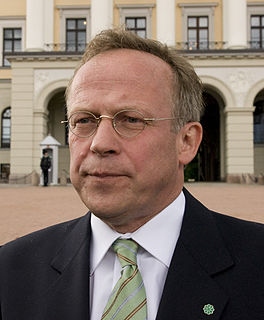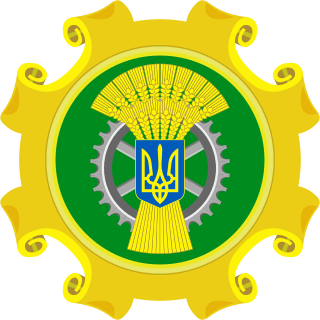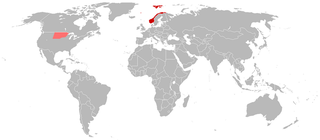
The Ministry of Agriculture, Fisheries and Food (MAFF) was a United Kingdom government department created by the Board of Agriculture Act 1889 and at that time called the Board of Agriculture, and then from 1903 the Board of Agriculture and Fisheries, and from 1919 the Ministry of Agriculture and Fisheries. It attained its final name in 1955 with the addition of responsibilities for the British food industry to the existing responsibilities for agriculture and the fishing industry, a name that lasted until the Ministry was dissolved in 2002, at which point its responsibilities had been merged into the Department for Environment, Food and Rural Affairs (Defra).
The Minister of Agriculture, Fisheries and Food was a United Kingdom cabinet position, responsible for the Ministry of Agriculture, Fisheries and Food. The post was originally named President of the Board of Agriculture and was created in 1889. In 1903, an Act was passed to transfer to the new styled Board of Agriculture and Fisheries certain powers and duties relating to the fishing industry, and the post was renamed President of the Board of Agriculture and Fisheries.

The Parliamentary Committees of the United Kingdom are sub-legislative organizations each consisting of small number of Members of Parliament from the House of Commons, or peers from the House of Lords, or a mix of both appointed to deal with particular areas or issues; most are made up of members of the Commons. The majority of parliamentary committees are Select Committees. The remit of these committees vary depending on whether they are committees of the House of Commons or the House of Lords.

Lars Peder Brekk is a Norwegian politician for the Centre Party. He was private secretary to the Minister of Fisheries 1985-1986, and himself Minister of Fisheries in 2000. He was elected to parliament in 2005 and served as Minister of Agriculture and Food from 2008 to 2012. He was acting leader of the Centre Party from June to September 2008.

Stoltenberg's Second Cabinet was the Government of Norway from 17 October 2005 to 16 October 2013. It was a coalition between the Labour Party, the Socialist Left Party and the Centre Party, known as the Red–Green Coalition. On 9 September 2013, the coalition was defeated in the 2013 election.

The Ministry of Agriculture, Nature and Food Quality is the Dutch Ministry responsible for Agricultural policy, Food policy, Food safety, Fisheries, Forestry, Natural conservation, and Animal welfare. The Ministry was created in 1935 and in 2010 the department was merged with the Ministry of Economic Affairs and was named the Ministry of Economic Affairs, Agriculture and Innovation. In 2017 the Ministry was reinstated. The Minister of Agriculture, Nature and Food Quality is the head of the Ministry and a member of the Cabinet of the Netherlands. The current Minister is Carola Schouten who also serves as Third Deputy Prime Minister.
Sir Brian Geoffrey Bender, KCB is a retired British civil servant, who served as the Permanent Secretary of the Ministry of Agriculture, Fisheries and Food and the Department of Trade and Industry.. He became Chairman of the London Metal Exchange in April 2010, and is a Governor of Dulwich College, a trustee of Lloyds Register Foundation and a non-executive Director of the Financial Reporting Council.

The Minister of Agriculture is a ministerial portfolio in the government of New Zealand. It existed from 1889 until 2012, when the Ministry got merged into the larger Ministry of Primary Industries, and again from 2017 onwards as part of the Labour coalition government.
The Royal Norwegian Ministry of Agriculture and Food is a Norwegian ministry established on February 17, 1900, and is responsible for agriculture, forestry and food in Norway. It is since October 2013 led by Minister of Agriculture and Food Sylvi Listhaug. The department reports to the parliament (Stortinget).
The Standing Committee on Labour and Social Affairs is a standing committee of the Parliament of Norway. It is responsible for areas related to the labour market, the working environment, benefits, pensions and disability policy. It corresponds to the Ministry of Labour and Social Inclusion. The committee has 13 members and is chaired by Arve Kambe of the Conservative Party.
The Standing Committee on Family and Cultural Affairs is a standing committee of the Parliament of Norway. It is responsible for policies relating to families, children and youth, gender equality, consumer affairs and cultural affairs. It corresponds to the Ministry of Culture and the Ministry of Children and Equality. The committee has 10 members and is chaired by Svein Harberg of the Conservative Party.
The Standing Committee on Finance and Economic Affairs is a standing committee of the Parliament of Norway. It is responsible for policies relating to economic policy, monetary and credit policy, the financial and credit system, financial administration, block grants to municipalities and counties, taxes and duties to the State Treasury, state guarantees for exports, National Insurance revenues, incomes policy and legislation relating to accounting and auditing. It corresponds to the Ministry of Finance. The committee has 18 members and is chaired by Hans Olav Syversen of the Christian Democratic Party.
The Standing Committee on Health and Care Services is a standing committee of the Parliament of Norway. It is responsible for policies relating to health services, care and attendance services, public health, drug and alcohol policy, and pharmaceuticals. It corresponds to the Ministry of Health and Care Services. The committee has 15 members and is chaired by Kari Kjønaas Kjos of the Progress Party.
The Standing Committee on Education and Church Affairs is a standing committee of the Parliament of Norway. It is responsible for policies relating to education, research and church affairs. It corresponds to the Ministry of Education and Research and the church affairs section of the Ministry of Culture and Church Affairs. The committee has 15 members and is chaired by Trond Giske of the Labour Party.
The Standing Committee on Local Government and Public Administration is a standing committee of the Parliament of Norway. It is responsible for policies relating to local government, regional and rural policy, immigration policy, housing policy, building and construction, national minorities, Sami issues, matters relating to the organization and operation of state administration, government administration, personnel policy for state employees including pay and pensions, and economic support for political parties. It corresponds to the Ministry of Local Government and Regional Development and Ministry of Government Administration and Reform. The committee has 15 members and is chaired by Helge André Njåstad of the Progress Party.
The Standing Committee on Transport and Communications is a standing committee of the Parliament of Norway. It is responsible for policies relating to transport, postal services, telecommunications, electronic communication and the responsibilities of the Norwegian National Coastal Administration. It corresponds to the Ministry of Transport and Communications and the coastal transport portfolio of the Ministry of Fisheries and Coastal Affairs. The committee has 15 members and is chaired by Linda Cathrine Hofstad Helleland of the Conservative Party.
The Standing Committee on Foreign Affairs and Defence is a standing committee of the Parliament of Norway. It is responsible for policies relating foreign affairs, military, development cooperation, Svalbard or in other polar regions and matters in general relating to agreements between Norway and other states or organizations. It corresponds to the Ministry of Foreign Affairs and the Ministry of Defence. The committee has 17 members and is chaired by Anniken Huitfeldt of the Labour Party. The members also sit on the Enlarged Committee on Foreign Affairs and the European Committee.
An agricultural attaché is a diplomat who collects, analyzes, and acts on information on agriculture, agribusiness, food, and other related spheres in a foreign country or countries. Agricultural attachés may be directly employed by the sending country's agriculture ministry, or they may be employed by the foreign ministry. Typical activities of an agricultural attaché include reporting on crop conditions, food availability, domestic agricultural policy and the foreign trade outlook in agricultural commodities; negotiating food aid agreements and agricultural credit lines; implementing agricultural technical assistance programs; facilitating professional contacts, exchanges, and technology transfer; assisting in negotiating bilateral and multilateral trade agreements; and promoting the exports of agricultural and food products. In many cases, agricultural attachés may also bear responsibility for issues related to the environment, food security, food safety, fisheries, forestry, and indeed anything related to rural areas and the rural economy.

The Ministry of Agrarian Policy and Food is a central executive authority of Ukraine in charge of country's agro-development. It is one of the oldest government agencies of Ukraine.

The Ministry of Agriculture, Food and Rural Affairs (MAFRA) is a cabinet-level division of the government of South Korea. It is headquartered in the Sejong Government Complex in Sejong City. It was established as Ministry of Agriculture, with the founding of the First Republic of Korea in 1948.











